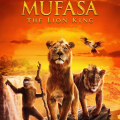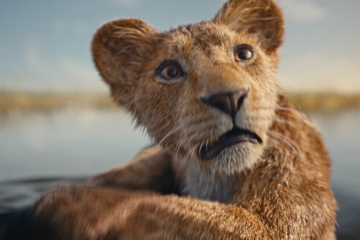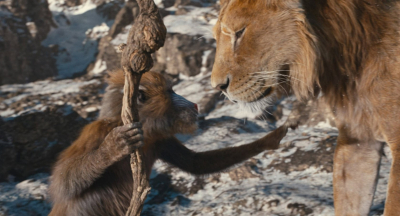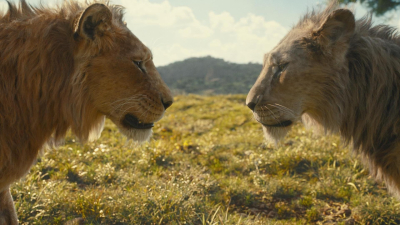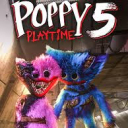Mufasa: The Lion King
The first time I laid eyes on Mufasa: The Lion King, I felt a rush of nostalgia mixed with excitement, knowing I was about to embark on a journey back to the Pride Lands. From the very first scene, I was reminded of the timeless tale that has enchanted audiences for generations. The anticipation that bubbled within me was palpable, and as the iconic score began to swell, I found myself fully immersed in this vibrant world.
As I immersed myself further into the film, I was instantly captivated by the breathtaking visuals. The animation was a breathtaking blend of realism and artistry, making every frame a work of art. The colors popped in a way that felt alive—lush greens of the savannah, deep blues of the night sky, and the rich golden hues of the sun setting on the horizon. It was as though I was sitting in the middle of a vast African landscape, surrounded by the wildlife that populates it. The attention to detail was impressive, from the way the wind rustled through the grasses to the gentle glimmer of dew on the leaves.
The storyline of Mufasa brings a fresh perspective to the classic narrative. While I knew the core story of Simba’s journey, the focus on Mufasa’s character and his legacy added a new layer of depth. I found myself invested in the tale of a father teaching his son about responsibility and the circle of life. Mufasa’s wisdom and strength resonated deeply with me, showcasing the pressures and joys of parenthood. The moments shared between Mufasa and Simba were heartwarming, bringing a smile to my face and tugging at my heartstrings.
One of the highlights for me was the voice acting. The cast brought such life and depth to the characters, enhancing my connection to them. The gravitas in Mufasa’s voice was palpable, reminding me of the strength I always admired in this character. The actors infused their roles with emotion, making me laugh during the lighter moments and feel the weight of the dramatic scenes. It was a reminder of how voice acting can profoundly influence how we perceive animated characters.
The musical score elevated the experience significantly. I found myself humming along to familiar tunes as well as new songs that blended seamlessly into the narrative. The music felt like another character in itself—filling the quiet spaces with emotion and intensity. The mix of original songs and reimagined classics painted an auditory landscape that was just as beautiful as the visuals. I appreciated how each piece complemented the storyline, adding another layer of engagement.
As Simba embarked on his journey of self-discovery, I couldn’t help but reflect on my own pathways through life's challenges. The themes of growth, loss, and redemption resonated on a personal level, prompting me to ponder my own experiences. The film's emotional narrative struck a mighty chord, reminding me of the universal themes of finding one’s place in the world and embracing one’s destiny.
The film's pacing was expertly handled, maintaining a flow that felt organic and kept the story progressing smoothly. There was a perfect balance between action-packed scenes and quieter, more introspective moments. This allowed me to savor the emotional weight of specific interactions, particularly between Mufasa and Simba, while also being swept up in the exhilarating adventures that unfolded.
The incorporation of humor was another delightful surprise. The film seamlessly blended moments of levity with its more serious undertones. Side characters like Timon and Pumbaa provided a comic relief that added a delightful contrast to the weighty themes explored in the story. Their antics made me laugh out loud, reminding me of the importance of humor even in challenging times.
Visually, the character designs were a lovely homage to the original animations while still offering a modern twist. Each animal felt intricately designed, capturing the essence of their real-life counterparts. Mufasa, with his majestic mane and regal stance, embodied the strength and nobility I always admired about his character. Simba’s transformation from cub to king was depicted beautifully, showcasing the evolution that came with growing up.
The animation techniques used to bring the film to life were nothing short of astonishing. I marveled at the fluidity of the movements—how each character leaped, bounded, and interacted with the environment around them. The fluid motion made action scenes feel exhilarating and impactful, while the calmer moments were infused with delicate realism. It was a masterclass in how animation can create a believable world.
Another feature that piqued my interest was the cultural elements intricately interwoven into the narrative. The film paid homage to its roots, incorporating African folklore and traditions that enriched the narrative. It felt like a celebration of the culture, paying respect to the land from which the story originates. This cultural depth added a layer of authenticity that I found profoundly moving.
The emotional score of the film was riveting, punctuating key moments and enhancing the overall atmosphere. I felt the power of the orchestral pieces intertwining with the narrative, guiding my emotions as each scene unfolded. The crescendos built anticipation, while the softer notes allowed for reflection—I was wholly absorbed in the moments being depicted on screen.
The film navigated complex relationships with grace. The dynamic between Mufasa and Scar was charged with tension, each encounter laden with meaning. It shaped a vital narrative layer, reminding me of the complexities of family dynamics and rivalry. The emotional struggles portrayed on screen resonated with me, enabling a deeper connection with the characters and their journeys.
Ultimately, Mufasa: The Lion King stood out as more than just a remake—it was a reimagining that breathed new life into a beloved story. It invoked nostalgia while challenging me to view the characters through a fresh lens. The seamless incorporation of visuals, music, emotional depth, and cultural elements created an experience that remained with me long after the credits rolled. I experienced a profound connection with the characters and themes, making me appreciate the timeless nature of this story all the more.
